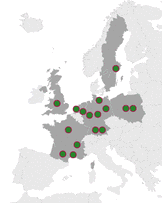WP02 - Recruitment and evaluation of patients
Objectives
WP2 ensures recruitment of participants by all clinical study centres and associated patient groups, evaluation of the study cohort, and integration of data in the I-DSD databases.
The aim is to ensure that physical and psychological assessments are performed in a standardized way by competent nursing medical staff. The WP2 organizes systematic biobanking of blood and urine for future research. The aim is to recruit 1500 subjects in total and enter patient data in the I-DSD database in accordance with informed consent.
Work Package Description
All participating centres are large national referral centres for DSD and are in close contact with associated hospitals or outpatient clinics which also offer clinical care of these patients.
After ethical approval of the study, physicians, psychologists and nurses will perform the study in a standardized manner in all study centres. Recruitment and evaluation of the participants will be monitored regularly by WP2.
We will collect and store DNA, serum, plasma and urine in a biobank, which will provide a unique resource for future research. The patients’ data will be integrated in the I-DSD database after informed consent of the patients.
Task 1 Recruitment of patients
The total number of patients in all study centres is about 3000. A participation rate of 50% is estimated. The minimum number of patients for the study is 500. We will recruit patients at all clinical study centres and via associated patients’ groups after ethical approval.
WP2 will work to ensure recruitment and reduce selection bias. The lead for recruitment in each study centre, will be supervised by the national coordinators and have regular contact with WP2. An information sheet containing criteria for recruitment will be distributed within the study centres. The number of patients declining participation, their reasons and diagnoses will be collected.
Task 2 Training of nurses, physicians and psychologists
Study nurses, experienced endocrinologists, gynecologists/urologists and psychologists will be trained and instructed to be able to conduct the study including physical examinations and helping patients with questionnaires if needed.
Task 3 Evaluation of patients
The patients are given thorough information about the study and after informed consent the evaluation will start. All patients must undergo the same evaluation in each study centre. This will include a medical questionnaire, which will be answered by the physician seeing the patient. Data on surgery, hormone therapies and counseling will be gathered from the patients’ files after the patients’ consent. A physical examination will be conducted by a gynecologist/urologist. A standardized datasheet of clinical findings will be completed for each patient. Hormonal and metabolic investigations will be carried out. Psychosexual development and psychosocial adaption, health related quality of life and psychological well-being will be evaluated by questionnaires answered by the patients online. The data will be entered anonymized into the DSD-Life database.
Task 4 Biobanking of blood and urine for future advanced translational research
Serum, plasma, 24-h urine and DNA samples will be collected and stored in the study centres and will serve as a valuable resource for future research.
Task 5 Integration of patient data in the I-DSD database
The patients will be registered in the I-DSD (former EuroDSD) database. Data will be entered by the study nurse, after informed consent by the patient.


